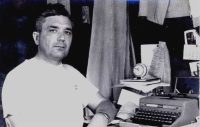It has happened! We are free! For the past few days heavy bombers have been going over, and fighters and dive-bombers have been going over the roads. It is now 5 a.m. The Japanese garrison has left, and the guard told our Central Committee that the camp would be turned over to them in an hour or so. Excitement is reigning. The “Star-Spangled Banner” is to be sung soon, and the flag – Our Flag – is to be raised at 6:30. At 7:30 p.m., What a day! I was too busy to continue writing this morning. The sudden departure of the Japanese was unexpected, although we knew our forces were nearing the shores of Luzon. Last eve, we attended an open-air concert of recorded music and went to bed at 9:30 “blackout”. I was awakened about 4:30 a.m. by shooting in the distance and by some of our neighbors going to the front of the barracks. Leo woke and said it must be nothing as the Japanese soldiers had been noisy all night – a custom of theirs. But as we listened, we heard Americans talking, and were soon sure that the whole garrison were leaving, and that we were to take care of ourselves.
We had a hot meal of mush at 6:00 and went to the flag raising at 6:30. There were many wet eyes as Old Glory was raised, on an improvised flagpole. We sang “The Star-Spangled Banner” and “God Save the King,” and again the handkerchiefs came out. Let me say that you who have never been deprived of seeing Old Glory and all she stands for, for three long years, cannot understand what that sight would mean. The Southern Cross was just disappearing from a southern tropical sky as the sun made the east red with its first rays. Two thousand People were grouped in front of Barracks No. 15, the Administration Building. Many were weak and sick from lack of food and unbalanced diet. Some were in worn out and patched clothing, some barefooted, some in wooden bakya. But all eyes were anxiously fixed on the slender bamboo after the bugle sounded for the ceremony to begin, Old Glory was hauled to the top slowly, and on a separate rope by Her side, the Union Jack — and both unfurled to the light early morning breeze.
For breakfast we had corn-rice mush (sweetened), coffee, and grated coconut. For supper we had camotes, greens, beef stew, and pork and beans. The best meals we had for months. A radio was found, discarded by the Japanese. It was repaired and we have the news. We know that a landing was made at Lingayen. Filipinos were contacted during the day and a few have brought food to friends and relatives.
